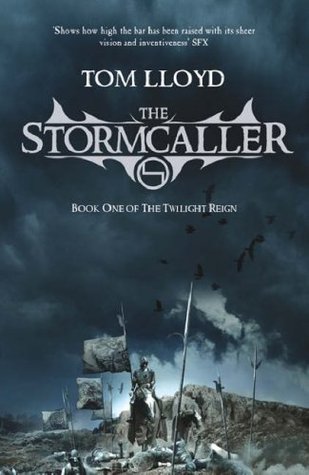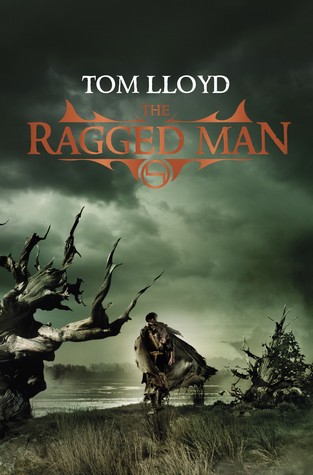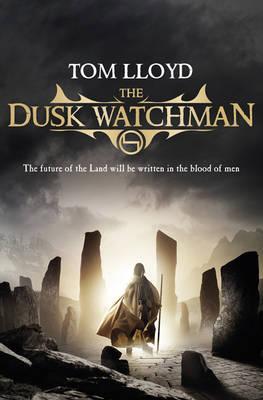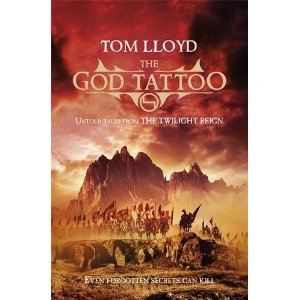Tom Lloyd is the acclaimed writer of the Twilight Reign series which currently hold 5 full volume books and 1 short story collection. Moon's Artifice is his latest book in his brand new series right up the alley for fans of Joe Abercrombie, George R.R. Martin and of course fans of Tom himself! I haven't had the chance to read any of the Twilight Reign books but sure am looking forward to reading Moon's Artifice!
Here is a short synopsis of the book (Out 21st of November 2013 by Gollancz)
In a quiet corner of the Imperial City, Investigator Narin discovers the result of his first potentially lethal mistake. Minutes later he makes a second.
After an unremarkable career Narin finally has the chance of promotion to the hallowed ranks of the Lawbringers - guardians of the Emperor's laws and bastions for justice in a world of brutal expediency. Joining that honoured body would be the culmination of a lifelong dream, but it couldn't possibly have come at a worse time. A chance encounter drags Narin into a plot of gods and monsters, spies and assassins, accompanied by a grief-stricken young woman, an old man haunted by the ghosts of his past and an assassin with no past.
On the cusp of an industrial age that threatens the warrior caste's rule, the Empire of a Hundred Houses awaits civil war between noble factions. Centuries of conquest has made the empire a brittle and bloated monster; constrained by tradition and crying out for change. To save his own life and those of untold thousands Narin must understand the key to it all - Moon's Artifice, the poison that could destroy an empire.
Author Bio:
Tom Lloyd was born in 1979 in Berkshire. After a degree in International Relations he went straight into publishing where he still works. He never received the memo about suitable jobs for writers and consequently has never been a kitchen-hand, hospital porter, pigeon hunter, or secret agent. He lives in Oxford, isn't one of those authors who gives a damn about the history of the font used in his books and only believes in forms of exercise that allow him to hit something. Visit him online at www.tomlloyd.co.uk.
-------------------------------------------------------------------------------------------
Hi Tom, welcome over to The Book Plank and for taking your time to answer these few questions.
TL: A
pleasure!
BP:
First off could you tell us more as to who Tom Lloyd is? What are your
likes/dislikes and hobbies?
TL: I’m a part-time writer living in an
office/shed at the bottom of his garden in Oxford. Occasionally I’m allowed
back in the house to look after the baby or dog, but that’s pretty much it. My
wife says I clutter up the place and it’s hard to argue with that. When not
working I’m playing tennis, tramping round the park with my direwolf, watching
either rugby or trashy TV shows, cooking or lamenting the lack of reading time
I have these days... My dislikes are pop music, clubbing, cheap &
chemical-filled food, hard work and, well, large tracts of the human population
for a variety of small-minded reasons.
BP:
Moon’s Artifice is your latest book, your first series Twilight Reign was your
debut entry into writing. When and where did you decide that you wanted to
become an author?
TL: I’m not really sure when it happened.
Books filled my parents’ house – when we went on holiday the family would take
a couple of dozen with us because that was the principle entertainment wherever
we went. I had no interesting in writing however, books were these magic things
that just existed, I had no idea the hours that got put into writing them.
Now
it’s been said, on occasion, that I have laziness and concentration issues.
When I started scribbling what would become Stormcaller in a notebook, I was
just passing the time before I went to uni – keeping out of the way in case my
parents made me get a summer job. Much to my surprise I didn’t get bored of it
so I scribbled on for those months then continued when I got to uni. I didn’t
study a whole lot, but I pushed on with the book and occasional short stories
so at some point it must have occurred to me that I wanted to do this instead
of working. By the time I left, I couldn’t think of any jobs I wanted to do
other than book stuff or secret agent – and publishing proved easier to get
into so that was that!
BP:
Now that you started your new series, did you gain any valuable experience from
your first series that you were able to use when you were writing Moon’s
Artifice?
TL: it’s hard to say what specific
experience it gave me – I learned to write during the course of the Twilight
Reign so it kinda taught me everything! Stormcaller was, by the time it got
bought & edited, something I’d revised half-a-dozen, slowly ironing out
flaws in my style etc.
What
finishing the series did tell me was what I wanted to do next however. I’d
started Moon already but by the end of Dusk Watchman I wanted different
challenges rather than a second huge epic series. Don’t get me wrong, I love
the Twilight Reign, but after years of work on it you want to move in different
directions, challenge yourself in other ways.
BP:
Moon’s Artifice is published this November, if you would have to market/sell
your book with a single sentence, how would it go?
TL: A fantasy policeman stumbles onto a
conspiracy that threatens to overturn the empire’s entire society.
BP:
The fantasy genre is quite competitive, loads of books are being published each
month, where do you think Moon’s Artifice draws it strength from to separate it
from the others?
TL: what sets it apart from this massive
& vibrant, wide-ranging set of books? Good you didn’t ask me anything tough
then... ;0)
Moon’s
Artifice is being marketed as swords and sorcery by the publisher, which I
don’t object to because people want a sub-genre description, but for me it
doesn’t really fit the book itself. It’s an urban-set fantasy action thriller –
no bearded wizards or hulking barbarians, no clashing armies or court politics
for that matter. The more comparable novels in the genre tend to have a badass
assassin or wisecracking thief as the hero – I’ve got a modestly-competent
policeman with questionable luck and judgement. The city is one of normal
people mostly willing to help a stranger out, not a collection of the grotesque
mingling with embittered antiheroes. While it started out, years back, as a
rather Japanese inspired culture, I revised that so it was more my own and not
overly on based any one nation, but people looking for a non European-medieval
fantasy should be happy enough!
BP:
Did you encounter any specific problems when you were writing Moon’s Artifice?
TL: it was tough just to set aside the
characters I’d lived with for a decade and have these new ones sit inside my
head. The logistics of this novel were different too, scenes and sentences both
needing to be shorter, it’s set over a handful of days not two years and I
wanted it to be a stand-alone not the intro to the remaining books. All that
means your approach has to be different and often I stalled just because I
wasn’t driving in the right direction and the words wouldn’t come.
BP:
What was for you the hardest part to write in Moon’s Artifice?
TL: Probably Narin. Enchei could have
been an aging member of the Brotherhood in Twilight Reign and Kesh tended to
flow quite naturally, but Narin was a tricky balancing act. He’s a trained
policeman, but not the finished article. He’s newly in love and terrified of
the fallout that’s coming from her husband. He’s facing with amoral killers
with unnatural abilities, but is no hard-boiled warrior himself and knows he
won’t get much chance to hesitate. There’s a blend of uncertainty, training,
purpose and fear inside him that I was only happy with once I’d reached the end
of the second draft.
BP: There are quite a few cool idea’s mentioned in the synopsis of the book, which part of Moon’s Artifice did you enjoy writing the most?
TL: I didn’t actually like writing it
because the mechanics are a real ballache, but the gods are an idea I really
enjoyed. Once mortal, they ascended into the heavens in a quite literal way –
the six greater gods reside in orbiting constellations of stars that together
shine as bright as our moon can. Around each of them are five lesser gods who
will complete a full circle of the greater god every sixty days. So the months
are named after the greater god at zenith at midnight and the weeks after the
lesser god who is currently leading that group across the sky. It takes a while
to picture and longer to work out the accuracy of idle references to
constellations in the sky, but I’ve always loved the image in my head – as much
as I love watching the lights of planes mingle with the stars.
BP:
Moon’s Artifice isn’t published yet, if you would be given the chance to do a
last minute change in the book, rewriting a chapter of a scene, would you do
so? And if yes, which one and why?
TL: You can always improve books, but
there’s no particular bit I want to change – I had enough opportunities to do
that before it was done so I’m pretty happy with the result! It might of course
be that reviews highlight things I hadn’t seen, but until then – it’s the story
I wanted to tell and I’m just glad it’s going to be out there for people to
read soon.
BP:
You are kicking of a new series with Moon’s Artifice, have you already mapped
out how many volumes the series will run? And is it possible to give a sneak
preview of what is in store for the readers?
TL: well that’s a tricky one. At the
moment we don’t have a US or big European publisher and how far we go may
depend on sales and translations, because I’ve got a mortgage to pay! I’m
working on the ending of Old Man’s Ghosts, which has Enchei’s past come back to
haunt him plus a bit of cold war nefariousness and Narin’s personal life seeing
even more dramatic ups and downs. After that, there’s a natural third which may
or may not be called The Army of Stolen Children, and a couple of vague future
plots involving Narin & Co, maybe even one or two set elsewhere in the
world. I want each one to be as stand-alone as possible though. There’s baggage
in their lives, but the central plot of each book will not drag on to later
books, only the ramifications thereof.
BP:
With finishing your first series and the start of a new one, do you have any
other projects that you would like to pursue in the near future?
TL: damn right, I just wish I was a
faster writer. These are all ideas that haven’t progressed beyond a basic idea
but I’ve got a high-concept epic trilogy I want to do, another that’s probably
a duology or trilogy, a few stand-alones – but ahead of them all is another
series of semi-stand-alones and a possible collaboration novel I’ve just
suggested to someone.
BP: Everyone enjoys fantasy in their own way, what do you like most about reading and writing fantasy?
TL: for writing, it’s the freedom. There
are often trope settings and certain expectations/requirements of a sort, but
once you have your basic idea you can take the world anywhere you want. What I
want from a book is an exciting plot and some humanity on show – so I don’t
read a lot of literary novels, but fantasy writers generally are really pushing
hard on both these days I think. On top of that you get to just say, ‘ok, let’s
see your idea and where you’re going to take it’ – you have to be open to
seeing something new, but it can be incredibly exciting to see how the
imagination moves.
BP:
And just lastly if you would have to recommend your top 5 favorite books, which
would they be?
TL: Favourites? Well there are more than
five but here are the ones I think of first: The Hobbit – Any Human Heart –
Deadhouse Gates – Excession – Lions of Al-Rassan







